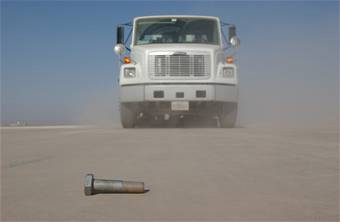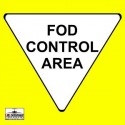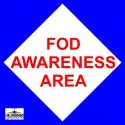FOD: A 3-Letter Acronym For Trouble
by Tech. Sgt. Phyllis Hanson
11/14/2007 – ALI AIR BASE, Iraq — If a rock bouncing out of a gravel truck can crack a windshield, imagine what that same rock can do to a jet’s engine or a cargo plane’s propeller.
 With the potential to cause over a $1 million in damage, foreign object debris can cause foreign object damage. Both are known as FOD and both spell trouble.
With the potential to cause over a $1 million in damage, foreign object debris can cause foreign object damage. Both are known as FOD and both spell trouble.
“On a daily basis we pick up anywhere from 1-3 pounds of FOD; rocks, nails, pens, sunglasses and bolts are just a few of the items we find on the runway, taxiways and parking aprons,” said Tech. Sgt. Reggie Tatum, NCO in charge of the 407th Expeditionary Operations Support Squadron’s Airfield Management Operations.
To keep the runways and aprons clear of debris, it takes everyone’s efforts.
Simply put, FOD reduction is crucial for mishap prevention, said Sergeant Tatum, who is deployed from Ellsworth Air Force Base, S.D.
Anyone who drives on the airfield is responsible for FOD, it is their responsibility to have to remove FOD when it is observed or report it.
Those who fail to do FOD checks can say goodbye to their flightline driving privileges for any given amount of time, which in turn can directly affect the mission.
Flightline driver’s training, which includes daytime and nighttime orientation and computer based training is a requirement for anyone who intends to drive on the flightline, said Master Sgt. Kevin Bay of the 407th Air Expeditionary Group flight safety office who offers the course.
Personnel who work on and around the flightline are on constant vigil when it comes to FOD, but at least twice per month volunteers are solicited to help out as an added assurance that there is no damaging debris.
During the last group FOD walk, more than 75 volunteers trekked en masse across the new runway on a hunt for FOD at the new MQ-1 Predator Unmanned Aerial Vehicle site. A “golden bolt” was planted as an incentive “to keep people’s eyes on the ground,” Sergeant Bay said.
“This clean up is crucial to success of a mission launch. Just for the sheer fact that one rock, one bolt, one scrap of foreign material that enters into a high-dollar asset can cause nothing but headache, heartache and hundreds or thousands of dollars and manpower to fix,” said Sergeant Bay, who is deployed from Hill AFB, Utah.
A T-Shirt, 407 AEG coin and a Predator coin was given to the “golden bolt” finder, Tech. Sgt. Anthony King of the 407th Expeditionary Services Squadron.
“It was a good way to support the Predator mission,” Sergeant King said.
Getting involved, and getting others involved is important, and 30 to 40 minutes of your time is all it takes to help out,” he said.
“It’s a change up in your daily routine, plus you get to support the aircraft mission. And if you’re lucky, you’ll stumble across the bolt like I did, said Sergeant King who is deployed from Littlerock AFB, Ark.
A key element to FOD prevention is the 407th Expeditionary Civil Engineer Squadron’s “Dirt Boyz,” who sweep the flightlines with the giant Tymco High Speed Vacuum Sweeper.
“We sweep up dirt, sand, sticks, leaves and rocks up to about 1 inch in diameter on the runways, taxiways and parking aprons everyday,” said Staff Sergeant Ivan Cosme, one of the seven Airmen who sweep the FOD.
The most difficult part about sweeper operations is cleaning the machine every day and changing out or rebuilding the head of the sweeper, or pick-up, he said.
Both are very time consuming and often times you will need more than two people to help you when it comes to rebuilding the head, he said.
“Knowing that all the aircraft that come into Ali Base can successfully take off and land with no damage done to the engines, and can continue on with their respectful missions, is the best part about the job, Sergeant Cosme said.
“Granted, everyone’s job is important, but I think sweeper operators have the most important task of them all. We work with the pavement and the pavement is our responsibility. From the first touch down until the last take off, that aircraft is our responsibility,” he said.
“We ensure that until the aircraft gets back in the air, that everywhere that it touches on the ground is FOD free,” said Sergeant Cosme who is deployed from Hickam AFB, Hawaii.



